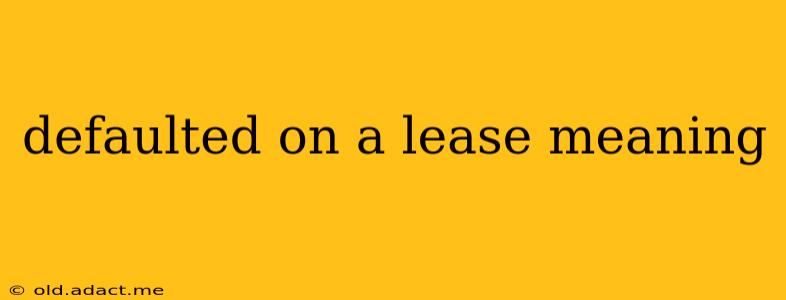"Defaulted on a lease" means that a tenant has failed to fulfill the terms and conditions outlined in their lease agreement. This is a serious breach of contract and can have significant consequences for the tenant. Let's delve deeper into what constitutes a default, the potential repercussions, and how to avoid such a situation.
What constitutes a default on a lease?
A lease default occurs when a tenant fails to meet one or more obligations specified in their lease agreement. Common examples include:
- Non-payment of rent: This is the most frequent cause of lease default. Missing even a single rent payment can be considered a breach of contract, depending on the lease terms.
- Violation of lease terms: Leases often contain clauses regarding pet ownership, subletting, property damage, and other stipulations. Breaching any of these clauses can lead to a default. For example, keeping a pet without permission, subletting without consent, or causing significant damage beyond normal wear and tear are all potential violations.
- Failure to maintain the property: Tenants typically have a responsibility to maintain the cleanliness and general condition of the property. Failing to do so, beyond reasonable wear and tear, could constitute a default.
- Illegal Activities: Engaging in illegal activities on the property is a serious breach of contract and grounds for lease default.
What are the consequences of defaulting on a lease?
The consequences of a lease default can be severe and vary depending on the jurisdiction and the specific terms of the lease agreement. Common repercussions include:
- Eviction: This is the most common outcome. The landlord can legally initiate eviction proceedings to remove the tenant from the property.
- Legal fees and court costs: The tenant may be responsible for covering the landlord's legal fees and court costs associated with the eviction process.
- Damages: If the tenant has caused damage to the property beyond normal wear and tear, they may be liable for the cost of repairs.
- Negative impact on credit score: A lease default can significantly damage the tenant's credit score, making it difficult to secure future housing or loans.
- Difficulty securing future housing: Landlords often perform background checks, and a history of lease defaults can make it challenging to find a new rental property.
What happens if I'm facing eviction for lease default?
Facing eviction is a stressful situation. It's crucial to understand your rights and options. This often involves:
- Communicating with your landlord: Try to negotiate a payment plan or other solution to avoid eviction.
- Seeking legal counsel: A lawyer specializing in tenant rights can advise you on your options and represent you in court.
- Exploring resources for assistance: Various organizations offer assistance to tenants facing eviction, including financial aid and legal support.
How can I avoid defaulting on a lease?
Preventing a lease default requires careful planning and responsible tenancy. Here are some key steps:
- Budgeting: Create a budget that includes rent as a priority expense.
- Reading the lease agreement carefully: Understand all the terms and conditions before signing.
- Maintaining open communication: Communicate with your landlord promptly if you anticipate difficulties meeting your obligations.
- Maintaining the property: Keep the property clean and in good condition to avoid repair costs.
- Seeking assistance if needed: Don't hesitate to reach out for help if you're struggling to pay rent or meet other obligations.
This information is for general guidance only and should not be considered legal advice. It's always advisable to seek legal counsel if you are facing a lease default or eviction.
